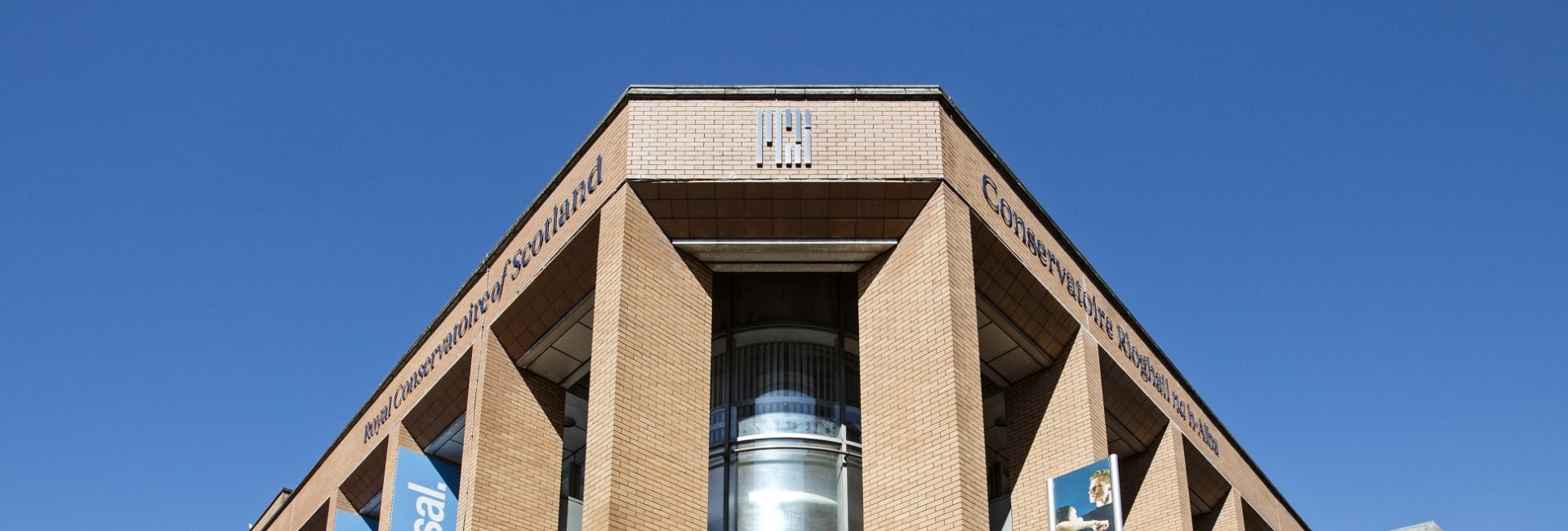Royal Conservatoire of Scotland: School of Music - Open Day
15 May 2025, 09:15
Glasgow, Lanarkshire


This degree is dedicated to traditional and folk music, and to the music of the Scottish Highland Bagpipe. Aspiring performers on this course explore Scotland’s unique and dynamic musical traditions as a conceptual, critical and creative framework within which to achieve a historically informed yet distinctively personal voice as a piper and artist. This is interwoven with a solid basis in contemporary and eclectic performance practice.
The Royal Conservatoire of Scotland and The National Piping Centre offer a specialist degree that allows pipers to study piping within the context of Scottish traditional music to the highest level. This unique course offers the chance for students to concentrate on the total study of piping in all forms, whilst also developing their performance skills under some of the best players in the world. Students receive instruction individually and in small groups and workshop settings. The degree includes substantial study of the history, repertoire, traditions, performance practice and organology of the bagpipes, producing expert performers with a deep understanding of their own, and other, traditions.
The nature of the Highland bagpipe and its repertoire, defined by highly individual and highly complex parameters of performance and musical structure, demands a teaching approach which integrates the instrument with the rest of Scottish traditional music while simultaneously respecting its uniqueness. The piping degree is therefore carefully structured to give the most thorough grounding possible in vital specialisms such as solo piping, piobaireachd, light music, and piping in a folk ensemble context, whilst sharing the same structure and range of contextual curriculum as in the main Traditional Music department.
The two programmes share an immense amount of common ground and the institutional emphasis is always on co-operation.
Please note, the international deadline for this programme is the 1st December 2024, but we would encourage applicants to apply by the 2nd October 2024 to be guaranteed consideration for the first round of scholarship
During the application and audition process, you must select which instrument(s) you wish to specialise in for the duration of your course. On this course, you can choose from the following options:
Only one specialism is studied. It may be possible to study a further instrument, but this will not contribute towards the qualification.
For all courses, you must select at least one specialism from the 'primary' list. For those studying primary/secondary pathways, two instruments may be selected – one from the 'primary' list and one from the 'secondary' list. Joint pathway students may select any two instruments from either list.
More information about what the course entails can be found on our website: https://www.rcs.ac.uk/courses/bmus-traditional-music-piping/
More information about what the course entails can be found on our website: https://www.rcs.ac.uk/courses/bmus-traditional-music-piping/

Learn what it's like to study at Royal Conservatoire of Scotland. From key stats to campus highlights, open days, and more - find everything you need to know here.
The following entry points are available for this course:
Applications for direct entry beyond Year 1 will be considered on a case-by-case basis and in accordance with the Royal Conservatoire’s Recognition of Prior (Experiential) Learning policy. Please email admissions@rcs.ac.uk for more information.
Currently around 20% of our students come from outside the UK. Between them, they represent over 60 different nationalities and add a rich diversity to the Conservatoire.
More information about our entrance requirements and international equivalencies can be found on our website.
Find out more about qualification requirements for this course.
| Test | Grade | Additional details |
|---|---|---|
| IELTS (Academic) | 6.5 | Applicants who first language is not English will be required to provide evidence of proficiency in English. An IELTS score of 6.5 in each component (with no component below 5.5) is required. |
Operated by the Office for Students
Employment after 15 months (Most common jobs)
Go onto work and study
The number of student respondents and response rates can be important in interpreting the data – it is important to note your experience may be different from theirs. This data will be based on the subject area rather than the specific course. Read more about this data on the Discover Uni website.
| Location | Fee | Year |
|---|---|---|
| Channel Islands | £9250* | Year 1 |
| Republic of Ireland | £9250* | Year 1 |
| England | £9250* | Year 1 |
| Northern Ireland | £9250* | Year 1 |
| Wales | £9250* | Year 1 |
| Scotland | £1820* | Year 1 |
| EU | £27968* | Year 1 |
| International | £27968* | Year 1 |
* This is a provisional fee and subject to change.
Tuition fee status depends on a number of criteria and varies according to where in the UK you will study. For further guidance on the criteria for home or overseas tuition fees, please refer to the UKCISA website.
Associated programme costs may be required for this programme for any new student at the start of their studies. For more information on please see our website - https://www.rcs.ac.uk/study/fees-funding/fees/
The Royal Conservatoire is able to offer a number of entrance scholarships which are awarded as part of the audition/selection process on the basis of merit and financial need. Please see our website for more information - https://www.rcs.ac.uk/study/fees-funding/scholarships/.
100 Renfrew Street
Glasgow
G2 3DB
Visit our website Visit our course page
Email:admissions@rcs.ac.uk
Phone:0141 332 4101
Fax: 0141 332 8901